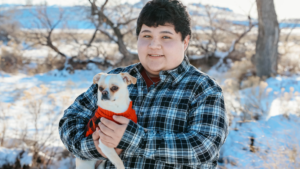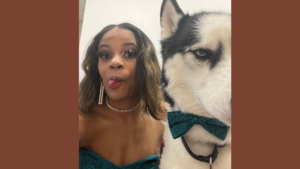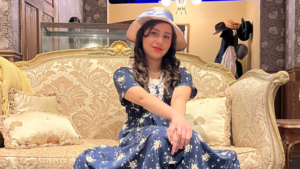This guest post is by Taylor Warren, a young woman on the autism spectrum who was accepted and into F.I.T. Taylor is applying for the Spring 2025 Making a Difference Autism Scholarship via the nonprofit KFM Making a Difference started by me, Kerry Magro. I was nonverbal till 2.5 and diagnosed with autism at 4 and you can read more about my organization here.
Autistics on Autism the Next Chapter: Stories You Need to Hear About What Helped Them While Growing Up and Pursuing Their Dreams will be released on Amazon on 3/25/25 and looks at the lives over 75 Autistic adults. 100% of the proceeds from this book will go back to supporting our nonprofits many initiatives, like this scholarship program. Check out the book here.
“Ain’t nobody tell you otherwise. You are special,” my mother would whisper to me and my twin sister, Jourdan, every night before bed. I took pride in being “special.” It was our mantra, a comforting reminder of our uniqueness in the world. But as I grew older, I began to question what it truly meant. The word “special” morphed into a label that didn’t always feel like a compliment—it often felt like a boundary I couldn’t escape.
I was delayed in everything, of course I didn’t remember this but it took awhile for me and my sister to speak, be potty trained, and learn to write. Occupational therapists would often come to our house, bare foot, we hid and would run away from them. I was someone special, so I went to a place that was special, or rather, filled with special people. In elementary school, I was filled with people who were just like me but all the more not like me at all. A special development school for me and my sister and other kids who were special. I was the talk of the colorful classroom. I had many friends, my sister did as well. In an environment where everyone is like you, you all gravitate towards each other. Delayed, I was, I started to catch up, speeding far beyond that of my classmates and eventually my own sister. Special was a degrading term, but now it was a positive one.
When I transferred to a new middle school, I thought I belonged because I was “special.” The hallways were overwhelmingly crowded with loud, chaotic students. I sought refuge in the arts, only to be told by a teacher that I was “ill-equipped” for the class because I lacked “prior experience.” His words stung. I couldn’t understand why being “special” suddenly meant I wasn’t capable. This pattern repeated itself across other areas: my handwriting was illegible, my stories felt unpolished, and my motor skills were clumsy. I loathed being “special,” even though I couldn’t fully articulate why.
In the culmination of the sixth grade, I met my sister’s friends during the classic festivities of field day. We chatted about interests, subjects, and hobbies. At some point in the conversation one of the girls mentioned how ‘normal’ I was in comparison to my sister. She would rock in her chair, excuse herself at random times mid conversation to run around the cafeteria, and would always cry; I didn’t do any of that, at least to them. I was the normal twin sister, why would I have to associate myself with her? I was normal when I was secluded in my room, rocking back and forth to music, running around spontaneously and becoming emotional after a long day of masking. My sister would often run away and hide within the school and I would always be called to try to look for her, it eventually escalated to her running away from home. She transferred schools, a special needs school. It was broken down to me the difference between me and my sister. “Your sister is someone who struggles, she has Aspergers.” Said my mother “But you are special, you’ll be able to take care of your sister since you are
I watched slowly as isolation seized all that I loved, my sister, and what revealed an undeniable truth: My shadow.
High school brought new challenges. The pressure to conform felt suffocating. I buried my quirks and lived under the weight of expectations that didn’t fit me. The world seemed designed for those who could glide through it effortlessly, not for someone who struggled with the texture of jeans, tasted colors too vividly, or needed accommodations to complete tests. I began to feel like an empty shell—silent, isolated, and disconnected.
Everything changed one day when I stumbled across a phrase online: “PDD-NOS.” It unlocked a rabbit hole of self-discovery. Autism. The word tightened something in my chest, but it also explained so much. The pieces of my life—small classes, IEP accommodations, moments of sensory overload—all began to fall into place. I realized I didn’t need anyone else’s permission to understand my identity.
Art became my outlet. Despite the physical pain caused by dysgraphia, I found comfort in creating. One day, I shared an ink splatter drawing with my psychologist. It was messy and chaotic, flowing off the edges of the page. “What does it represent?” he asked. “Me,” I replied, “I’m autistic, but I still want to go into honors classes next year.” His smile gave me the confidence to keep pushing forward.
Embracing my identity transformed my life. Honors and AP classes followed, where I explored how race shaped my self-esteem, how being aromantic and asexual redefined my understanding of love, and how breaking free from gender binaries liberated me.
Art remains my greatest passion. Animation, in particular, allows me to merge storytelling with vivid imagery, creating a medium that transcends words. It is a tool to provoke thought, challenge societal norms, and celebrate individuality. Despite the challenges of dysgraphia and societal expectations, I have reclaimed the “special” my mother always spoke of. I have built a masterpiece from the fragments of what others dismissed, and in doing so, I have reunited with my shadow—the truest version of myself.
With every stroke of my stylus, I aim to change the world, one frame at a time.
Kerry Magro, a professional speaker and best-selling author who is also on the autism spectrum started the nonprofit KFM Making a Difference in 2011 to help students with autism receive scholarship aid to pursue a post-secondary education. Help us continue to help students with autism go to college by making a tax-deductible donation to our nonprofit here.
Also, consider having Kerry, one of the only professionally accredited speakers on the spectrum in the country, speak at your next event by sending him an inquiry here. If you have a referral for someone who many want him to speak please reach out as well! Kerry speaks with schools, businesses, government agencies, colleges, nonprofit organizations, parent groups and other special events on topics ranging from employment, how to succeed in college with a learning disability, internal communication, living with autism, bullying prevention, social media best practices, innovation, presentation best practices and much more!














